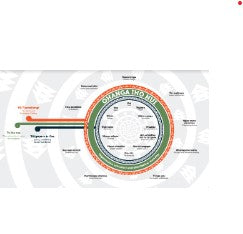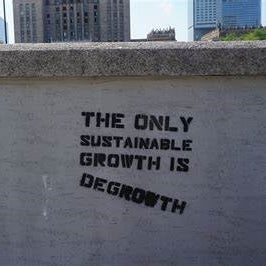We have a huge opportunity coming out of lockdown to change the way our whole economy works and to empower those who have been less advantaged. This is our international opening to return to a circular economy that returns to some decentralisation, providing skills and opportunities for social and environmental entrepreneurs using shared spaces and facilities (makerspaces, kitchens, tech labs), extending our conventional educational facilities of schools, techs and universities.
We need to look at our minimum AND maximum income levels, so that they align with the 101 of Economics, managing to live within our nine planetary boundaries (land conversion, air pollution, freshwater withdrawals, ocean acidification, climate change, ozone depletion, chemical pollution, nitrogen & phosphorous loading and biodiversity loss) through examples discussed in Doughnut Economics.

Decentralisation of our workforce
For the last 50 years, we have been focused on a free and open international economy which has allowed for a linear approach to how we deal with our earth’s natural resources. We ship and fly resources around the world multiple times and then again to be stocked in retailers. This needs to stop.
We now have stockpiled“waste” that cannot be shipped elsewhere as no country wants it. But it is a resource and has been proven to be reused albeit currently at a higher cost that new unsustainable resources. This is where we need investment into a long term scalable sustainable solution for our“waste” resources. Our international community must take the opportunity to look at these resource streams, their value and invest in their continuous use.
Every town and city in New Zealand and globally has an ability to create an economy from resources already at their fingertips. In conjunction with scalable digital resources and makerspace, a decentralised economy of the future is a massive opportunity.
Critical Design andFuture Post are examples of companies reimaging plastic waste into high-value products. There are many small upcycling businesses who reuse wood and make funky designs with examples including Funk Up My Junk, The Pallet Kingdom and Daniel Barnes.
The ReCreators are currently developing scalable designs from small scale fabric waste that could be stocked in large retailers by making educational DIY kits for kids (and potentially adults in the future) show how our“waste” resources can be turned into value if we just think differently about our purchasing options.
The main stumbling block for most small-scale circular designers is the combined role of design, making, marketing and sales, in which there is not enough time or financial resources. These items also need to be valued by consumers for the labour that goes into remaking with our existing resources. Solutions include scalable designs that would be purchased in bulk to allow a circular brand and company to thrive and pave the way for others to do so too.
Skills-based resilience
If we have learned nothing else from the lockdown, it should be that we need to have resilience skills through hard times. We have seen a huge demand for seedlings and flour indicating that people are willing to go back to the basics of how we live – understanding how to grow and cook good quality food. Our society has lost many skills over the last 50 over-consumeristic years. We have been marketed to death that we have a problem and that blah blah product will help us gain efficiencies on our days. In reality, this has disabled us, making people feel anxious and mentally unwell (check out the article on creativity for mental wellbeing). Now basic skills seem difficult (such as gardening, cooking and DIY) and we have been disempowered. The lockdown will turn this around with many people learning to make and craft again, releasing joy from creation and satisfaction from self-sufficiency.
Through reusing our waste resources streams, we can learn to make, relearn skills lost AND earn a sustainable income.

Social Enterprise Opportunities
Like a phoenix from the ashes, it’s time for the small-scale entrepreneurs to come out of this lockdown, hungry for new opportunities. Learning from past mistakes and awaking to a new future that is greener and more equitable in income. Social entrepreneurs should take advantage of this time to dwell on new business models that will entice those who want to see a change (hopefully our liberal governments – clearly not in all countries!!!).
Makerspaces as a key part of our entrepreneurial community
At the core of decentralisation and empowering small-scale entrepreneurs are makerspaces. Places that have high tech equipment used for making locally but shared by all. This will be at the core of our new decentralised economy. Renting times and spaces to manufacture from existing resources. The time away from these spaces used for marketing, sales, networking and designing. We don’t all need to be beside large-scale equipment.
Circular ReDesign at the core of our new economy
ATEED and Circularity have been timely in their introduction of the first Circular Economy think tank called Xlabs. While the five weeks in-person challenge has been cut short – on digitally lengthened, it is an ideal opportunity to look at new scalable, sustainable economic systems. We have been learning about
- Networked Participation (collective, outwards, global, digital)
- Embedded Intelligence (decentralised, realised value, simplified views and open/trusts sources)
- Circular Business Models (circular inputs, resource recovery, sustained lifespan, products as services, sharing platform)
- Closed Loop Systems (ongoing systems, food, second life, resource and reverse logistics)
- Regenerative Behaviours (connected, true-value/cost, agency, restorative)
- Smart Materials (renewable, waste as a resource, local, regenerative, manufactured)
Copyright Circularity 2020
Lockdown has shown us that we can take drastic measures when needed. Covid 19 is a drop in the bucket in comparison to what lies ahead if we continue to release excessive carbon into our atmosphere at current rates. We need not only to cut emissions but to sequester the carbon. In addition, we need to stop thinking solely about carbon but how it impacts on all our other planetary boundaries. That means we MUST BE CIRCULAR in design, thinking and in our economic approach.
Conclusion
While this will be an immensely difficult time for many people on our planet, it is also a massive wake up call. Its as if Mother Nature is giving us a final opportunity to turn things around before its too late. She is showing us that we can take decisive action quickly that will change our future forever.
We can do it and we have a government now who can enable this type of change so let’s hope they do.
Leave a comment (all fields required)
Comments will be approved before showing up.

